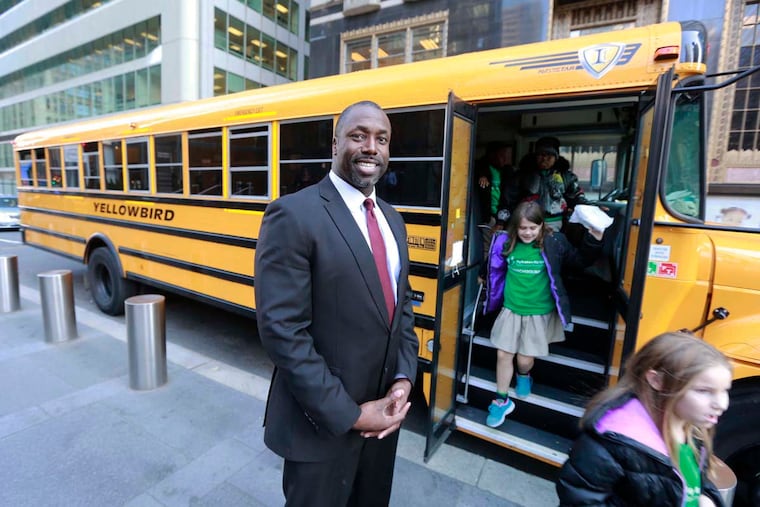
Marcus Allen, 43, leads the Big Brothers Big Sisters Independence Region, but when the former pro basketball player applied to be a "Big," and mentor a youngster, his own group turned him down.
"I'm the CEO. I sign the checks," Allen said.
"They said, 'Well, Marcus, I hate to deliver this news, but you can't be a Big right now.' "
It turns out the staff decided that his recent divorce and full plate of duties at the group made him too busy for the job. "They were not sure that I would have the time, given all the things that I was doing," he said.
Until Jan. 1, Allen led the Big Brothers Big Sisters Southeastern Pennsylvania - the 100-year-old group. Even as the group celebrated its anniversary, it was planning its merger with the Big Brothers Big Sisters Burlington, Camden and Gloucester Counties, to be announced Monday. Allen now leads the combined group.
Why was divorce an issue?
Any time someone is in transition, whether you've got a new job, divorced, just moved to the city, those different factors can affect your ability to focus on a child.
Is it hard to get "Bigs?"
We have a challenge recruiting men, particularly African American men. Some people feel like they're too busy. I've had guys who are 55 say, "How does it look for a 55-year-old man to volunteer for a little kid?"
Wow, is that the Sandusky effect - the former coach and convicted pedophile? Yeah, especially if you have an older white man who's going to be working with a black kid. There's pressure and there's a fear of the risk of what could happen if you even say the wrong thing. We live in such a sensitive environment now.
How do you address that?
They say, "What can I do as a white man working with a kid from Mantua or West Philadelphia? I'm from the suburbs and I have a corporate job." I say, "The greatest thing that you can offer a kid, regardless of color, is your ear. Our kids need someone they can trust and someone who is going to be consistent."
As you grew up, you saw your uncle shot to death and you were homeless.
I saw a lot of violence. People sometimes don't understand the amount of violence and the adult things that [poor] kids see growing up.
People are surprised by the crime that follows [a high poverty rate]. I remember my grandfather who sold liquor and beer out of the house to make a living. I remember my cousins and uncles selling drugs and just trying to take care of family. Some of the experiences weren't really viewed as crime. It was viewed as "This is how we get by."
Did you have mentors?
I had a grandfather who was a mean tough son of a bitch, but he loved me. He was the primary man in my life until I saw that as a model for me of things to do and not to do.
When I was about 9 or 10 years old, I was playing football and there was a police officer. He was our coach and he took an interest in me.
You played pro basketball?
I originally went to the Denver Nuggets. Very early on I had a knee injury. So I never got a chance to play for them. So I went to Stockholm and did two years there and two years at Helsinki and a year in Israel and a year in Argentina.
You are so tall. Do you think height helps leaders?
Absolutely. It's handy being tall and it's handy being black. I would imagine that I get more attention being black and 6-foot-7 than a white man being white and 6-foot-7.
Why is that?
We live in a sports culture. So they're automatically going to assume that I'm an athlete. They're not just necessarily going to assume that the white guy is an athlete. If you are a sports fan, you're going to want to know who I am. That's a tall privilege.
Tall privilege?
We all have privilege. Nobody should feel like they should feel bad about it.
I'm not one of those people who think that because you're a certain way, you should bear the burden of what other people who look like you have done. Sometimes I see that there's some white guilt when I have a conversation.
That's just like you blaming me for something my forefathers did to somebody who looks like you. We're all in this boat together and people who don't see that are losing sight of the big picture.
Interview questions and answers have been edited for space.
215-854-2769@JaneVonBergen